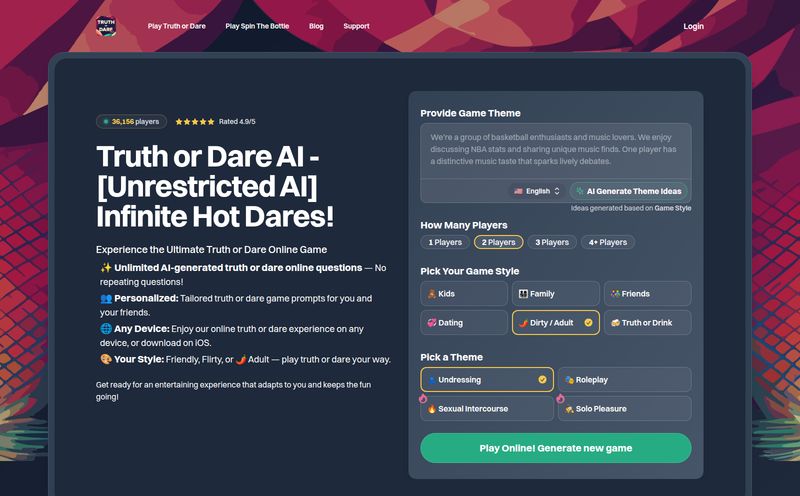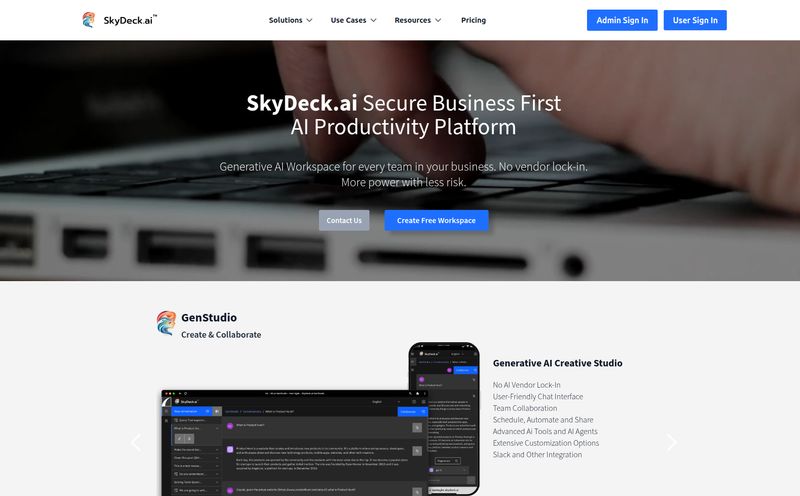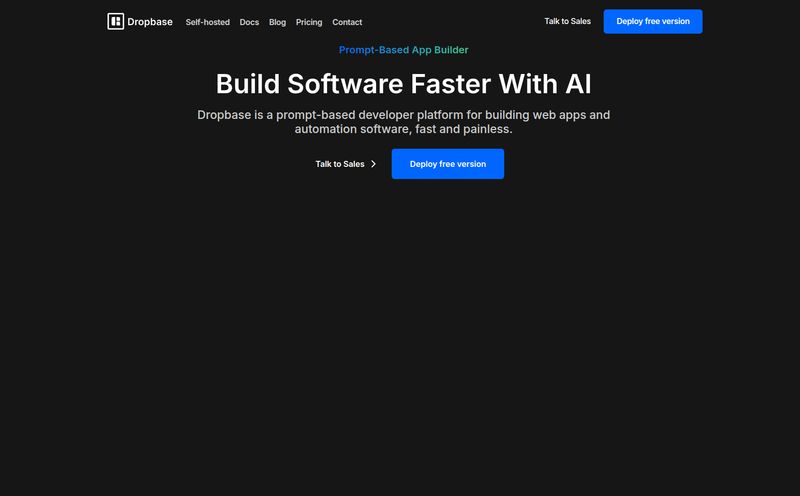The AI gold rush is in full swing, and everyone, from your local pizza place to multinational banks, is scrambling to figure out how to use it. We're all being told to integrate AI or get left behind. But there's a quiet, nervous conversation happening in IT departments and boardrooms everywhere: "Where is our data actually going when we use these amazing cloud-based AI tools?"
It's the multi-trillion-dollar question. For years, I've worked with companies that treat their data like state secrets—because, well, it often is. We're talking about proprietary research, sensitive customer information, and financial data that would make your head spin. The idea of just piping all that juicy info into a third-party's black box, no matter how reputable, gives seasoned CTOs night terrors. I've seen the hesitation firsthand. The desire for innovation is there, but the fear of losing control is a powerful brake.
So, when I stumbled upon a platform called basebox, my curiosity was definitely piqued. Their whole pitch is basically a counter-narrative to the cloud-first mantra we've been hearing for a decade. They’re offering a way to use powerful AI, but on your own turf. Your servers. Your rules.
So, What on Earth is basebox?
Imagine you're a world-class chef. You can either rent a spot in a massive, shared commercial kitchen—like a public cloud—where you get access to tons of equipment but have to share space, follow the building's rules, and maybe you're not super comfortable leaving your secret family recipes lying around. Or, you could build your own professional-grade kitchen in your own building. You have to supply the infrastructure, sure, but you have total control. The security is yours, the layout is yours, and your secret sauce stays secret. That’s basebox.

Visit basebox AI
In slightly more technical terms, basebox is a secure AI management system that you install in your own infrastructure. It acts as a secure container and control panel, allowing your teams to use various AI models and applications without your sensitive data ever leaving your on-premise servers or private cloud. It's not an AI model itself; it's the secure, walled garden where your AI models can play safely with your data.
The Great Debate: Your Infrastructure or Theirs?
The core of the basebox value prop comes down to a fundamental choice: using a public cloud AI service versus running things on your own iron. The company is pretty clear about where it stands.
Public clouds are great for getting started quickly. They're relatively easy, you don't need a huge IT team to spin something up, and you benefit from the massive scale of providers like AWS, Google, or Microsoft. But that convenience comes with a trade-off. You're operating on their servers, subject to their terms, and navigating the sometimes-murky waters of data compliance and potential security risks that come with a shared environment.
basebox champions the on-premise or private cloud approach. Here, you get what they call full control. That's not just a marketing buzzword; it's the whole point. You're meeting strict regulatory requirements because the data never leaves your sight. The system is designed to work with your existing IT, not against it. And the costs, while different, are directly tied to your own usage, not pooled with thousands of other users. For organizations in heavily regulated fields, this isn't just a preference; it's a necessity.
A Few Standout Features
Digging through their site and the info I could find, a few things really jumped out at me as a long-time SEO and tech guy.
Unprecedented Data Sovereignty
This is the big one. Data sovereignty is the idea that your data is subject to the laws and governance structures of the nation where it's collected. When you send it to a server in another country, things get... complicated. By keeping everything on-premise, basebox helps companies sidestep that entire mess. This is massive for anyone dealing with GDPR in Europe, HIPAA in healthcare, or any other regional data protection laws.
They have a testimonial on their site from a researcher at a German Heart Center at TUM, which says a lot. Kai B. mentions, "basebox on-premise lets us analyze patient data while maintaining complete data sovereignty with an unprecedented level of security." When you see a medical research institution giving a nod like that, you know the security claims aren't just fluff.
It Plays Nice with Your Existing Setup
The phrase "seamless integration" gets thrown around a lot, but here it seems earned. No one wants a tool that requires them to rip and replace their entire infrastructure. basebox is designed to be a layer that sits within what you already have. It connects to your systems, providing a centralized place for your team to access AI without creating a whole new, isolated tech silo. This means less friction, faster adoption, and happier IT admins (a rare and beautiful thing).
A Central Command Post for AI
One of the scariest things for a large company is "Shadow IT"—when employees start using unauthorized apps and tools to do their jobs. The same thing is happening now with "Shadow AI." A centralized system like basebox gives the organization a single point of control. They can manage who has access to which AI models, monitor usage, and keep a tight lid on processes. It’s about enabling your team, not letting them run wild in a way that introduces risk.
Okay, Let's Talk About the Price Tag
Alright, here we go. I clicked over to their pricing page, which boldly proclaims "Simple. Transparent." And then... nothing. Just a vast expanse of clean, white space. Oh, the classic enterprise software move. As someone who's been in this industry for a while, I get a little chuckle out of this. It’s the digital equivalent of a car salesman saying, “If you have to ask, you can’t afford it.”
In all fairness, there's a reason for this. A solution like basebox isn't a one-size-fits-all product. The cost will likely depend on the scale of your operation, the number of users, the specific integrations you need, and the level of support. It’s a bespoke solution for a complex problem. So, while the lack of a public price list is a bit of a letdown for curious folks like me, it makes sense from their business perspective. You're going to have to get in touch with them for a quote. Just be prepared for a conversation, not a checkout cart.
Who is This Really For?
Let's be crystal clear: basebox is not for the solo blogger looking to generate article ideas or the small ecommerce shop wanting an AI chatbot. This is a heavy-duty tool for a specific type of client.
You should be looking at basebox if you are in:
- Healthcare: Where patient data privacy is non-negotiable.
- Finance and Banking: Where financial records and customer data are protected like Fort Knox.
- Government & Public Sector: Handling classified or sensitive citizen information.
- Manufacturing & R&D: Protecting trade secrets and proprietary designs.
- Legal: Managing confidential client case files.
If the thought of your data being on an external server makes you break out in a cold sweat, you are their target audience.
The Other Side of the Coin
No tool is perfect, and a fair review means looking at the potential downsides. To use basebox, you obviously need to have an on-premise or private cloud setup. You can't just sign up with a credit card and start using it in five minutes. This requires an existing IT infrastructure and a team to manage it. There will be an initial setup and configuration process, which is an investment of time and resources. This isn't a flaw, per se, but it's a critical prerequisite that narrows its audience significantly.
Frequently Asked Questions About basebox
- Do I need my own servers to use basebox?
- Yes, absolutely. The entire point of basebox is that it operates within your own IT infrastructure, whether that's on-premise servers or a private cloud that you control. It's not a public SaaS product.
- Is basebox an AI model like ChatGPT?
- No. Think of basebox as a secure management platform or an operating system, not the AI application itself. It allows you to securely run and manage various AI models (which could include open-source models or even custom-built ones) within your own secure environment.
- What kind of security compliance does this help with?
- Its core design is built for high-stakes compliance. By ensuring data never leaves your premises, it directly helps with regulations like GDPR, HIPAA, and other local data sovereignty laws that govern how sensitive information is stored and processed.
- How much does basebox cost?
- The pricing isn't publicly listed. It's an enterprise solution, so you will need to contact their sales team directly to get a quote based on your organization's specific needs and scale.
- Is it hard to set up?
- There is an initial setup and configuration process, as with any enterprise software. However, it's specifically designed to integrate with existing IT systems, which should ease the process compared to building a similar solution from scratch.
My Final Verdict on basebox
In a world screaming "move to the cloud," basebox is a confident and necessary voice shouting, "Wait, not so fast." It’s not for everyone, and it doesn’t pretend to be. It's a specialized tool for a specialized, high-stakes problem: using the power of AI without giving up control of your most valuable asset—your data.
For the right organization, basebox isn't just a cool piece of tech; it's a strategic enabler. It bridges the gap between the bleeding-edge potential of artificial intelligence and the iron-clad security requirements of the real world. In an era where data breaches are a weekly occurrence, taking back control doesn't sound like a step backward. It sounds like a very, very smart move.
References and Sources
- basebox Official Website
- Deutsches Herzzentrum München (TUM) - Referenced in the testimonial.



